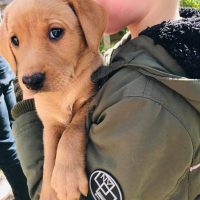 Buying a puppy is a long-term commitment. It’s important to research breeds and breeders thoroughly and consider what would happen if your circumstances change at any time during the dog’s lifetime.
Buying a puppy is a long-term commitment. It’s important to research breeds and breeders thoroughly and consider what would happen if your circumstances change at any time during the dog’s lifetime.
Some things to look out for in a reputable breeder:
– All health tests relevant to the breed have been done in both the Sire and Dam, and they are only used for breeding if the results are acceptable. “Vet checked” does NOT mean health tested.
– Kennel Club registration is not a guarantee of quality nor that the breeder is reputable. However, reputable breeders of pedigree dogs will always register the litter. “Pedigree dog with papers” is NOT the same as KC registered.
– They will be bred and reared in the home environment, if the puppies are going to be homed as domestic pets.
– They will have started habituation and socialisation to household life, people, other animals and some basic training, including toilet training.
– They will take back a puppy that cannot be kept by the original purchaser at any time in its life.
– They will allow you to see the Dam with her puppies so you can assess the temperament of the mother. You should be allowed to see the whole litter and be able to handle them, rather than just seeing the puppy being offered to you. They should want you to meet the puppies (and to meet you) prior to the take-home date.
– They will expect you to ask plenty of questions and will want to know about the home you can provide one of their puppies.
– They wont sell pure working lines to pet-only homes. If the puppies have docked tails, they are registered as working.
– They are unlikely to sell two littermates to one person, apart from in exceptional circumstances.
– Good breeders have a waiting list on their litters before the puppies are even born. Therefore be prepared to ask around and take your time in being successful in finding a well-bred puppy.
Once you have found your reputable breeder, pay your puppy a visit as many times as you can before you bring it home. The puppy can then get to know your scent profile, making the transition to its new home much easier. If you have other pets at home you can also use this time to prepare a scent cloth to introduce the scent of the puppy to your dogs/cats at home. To do this, stroke the puppy with the cloth or let the pups play with it for a bit. Once you are home, produce the cloth for your existing dogs/cats to smell, followed by food. You can place the cloth in upturned flower pots or scent boxes and do the same thing, so that it is clearly the scent that leads to the good stuff, not the cloth itself. This should create a positive emotional response to the scent of your new puppy, even before they arrive home!
Puppies at 6 weeks old should still be with their mum and siblings. This is a critical period in their development where they’re learning loads of social skills. Play fighting is a favourite past-time and it is a valuable way of understanding boundaries and reading body language. They are also at a developmental stage where they’re hugely curious about the world around them, so it’s important that the breeder’s environment is enriched with novel objects and toys and the ability to explore different surface textures and scents. Teeth are still erupting so lots of items to chew on to relieve pain and discomfort are also essential. A barren rearing environment is hugely detrimental- brain size and weight will be lower than those puppies reared in an enriched environment, along with fewer neural connections.